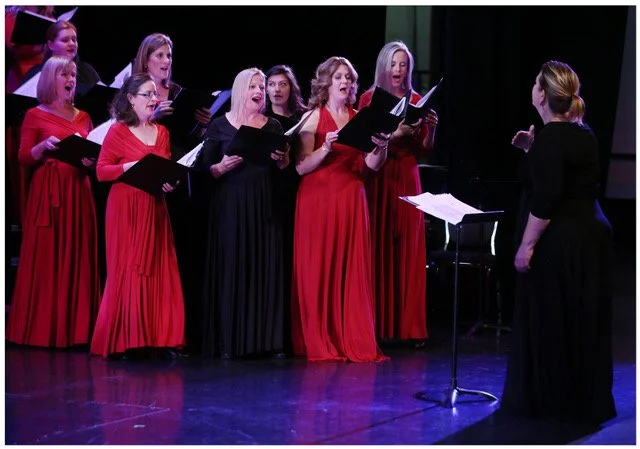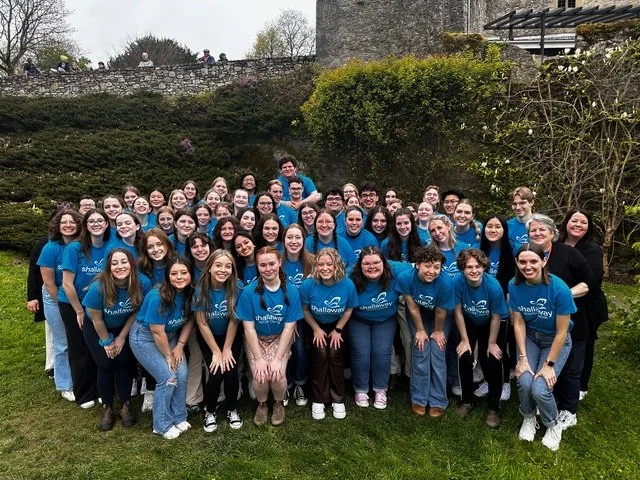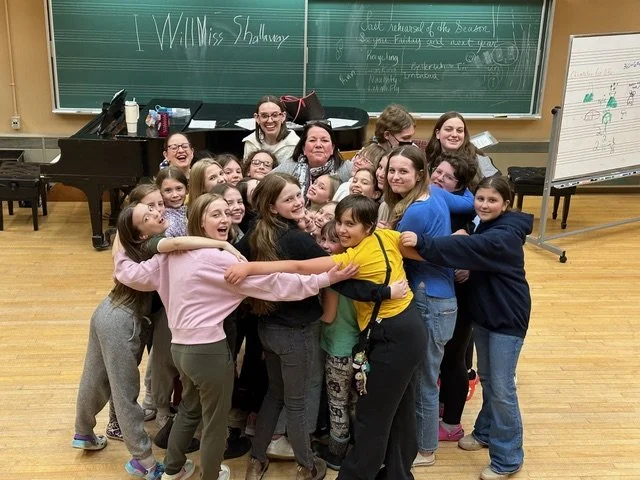Spotlight on Kellie Walsh: (Un)Common Threads 2025 Featured Speaker
As the founder and Artistic Director of the award-winning Lady Cove Choir, Artistic Director of Shallaway Youth Choir, co-founder and Artistic Director Emeritus of Newman Sound Men’s Choir, and co-founder of Ullûgiagatsuk, the Inuit Youth Choir from Nunatsiavut, Labrador, Kellie Walsh has been helping people of all ages find their voice for several decades now.
For Walsh, collective singing isn't just about creating beautiful music together, it's about building empathy, building community and building bridges. It's also the perfect instrument to help people get in tune with themselves, and each other.
We're thrilled to have Walsh as a featured speaker at our (Un)Common Threads Creativity & Innovation Summit on November 4 in St. John's, where she'll present her talk "Leading with Heart: Creativity, Culture and the Next Generation."
We recently caught up with her to chat about the transformative power of choral music, her own approach to creativity, and why, in this age of AI, collective singing is more important than ever.
Kellie Walsh
Business & Arts NL: As an experienced arts professional with decades of practice, working with many different individuals and groups over the years, what does creativity look like to you? And how do you keep your creativity intact and fresh?
Kellie Walsh: I guess for me, creativity isn't this separate thing that you switch on and off when you need it. I think it's how you approach people, how you problem solve — really, how you see the world around you, how you see your community. So I think for me, creativity is listening and observing, and not just in the choir practice, but how I observe the world around me.
Working in the arts for as long as I have, I've learned that being creative is really about being open. It's being open to ideas. It's being open to risk. It's being really open to other people's perspectives and especially open to things that you don't understand. So keeping my creativity intact or fresh or new, it really means being curious and often it means being uncomfortable. Like when I say, "Oh, I know how to do this," or “I feel really comfortable in this," it always sparks something in me to say, "Okay, I need to dig a bit deeper." Not that I'm always looking for the newest/next thing; but it just shakes something up in me that I try to go beyond what feels really safe. I find myself really being driven towards things that stretch me and that challenge how I think about people, how I think about music and especially how I think about leadership — and sometimes that's commissioning a new work and other times, and more recently, it's become trying to work together to create spaces for voices that haven't been heard, because those new voices are the ones where we learn new things. So that's where creativity, where that spark, lives for me and in me. So it's right there in the middle of risk and connection. When I'm in those spaces, where I feel deeply connected but also there's risk taking happening, both with the people I work with and within myself, that's where I really feel like creativity happens, because it's where all the learning is happening.
Really, to be honest, it's the people that I feel inspired to be creative with and for, different groups, different people. Whenever I travel to a new place with a group of people, it brings such a new kind of energy and a new challenge and a new opportunity. It really shakes up my preconceived ideas about things...and I find people always push me to find new ways of connecting dots, because everyone is so different.
So again, it's not about chasing novel things. I think it's always about being awake...and being observant; and especially being awake to what the world is trying to show us.
Kellie Walsh conducts members of the Lady Cove Women’s Choir.
Business & Arts NL: What do you believe is the thing your choirs contribute most to the community? And why is communal music-making important?
Kellie Walsh: I think what the choirs bring to the community, and to the community in which they belong — obviously, there's a greater community of our province, our city, our country...one of the most important things they bring is a sense of belonging and a shared space where people can be both vulnerable and strong at the same time. And in order to be creative, you have to be able to be vulnerable and you have to be able to be brave. So I think that happens all the time in choir.
Choral singing teaches empathy in a physical way, because you're in a room with people and you're creating together...you're in the space with them and you're dependent upon each other. You literally have to breathe together. You have to listen to each other. Sometimes in milliseconds, you have to adjust, you have to support, not only musically but emotionally. It's a model, I think, for how communities could work if we all listened that carefully to each other and we were that aware of each other the way people are within that choral context. I think that collective is so exciting and has more capacity than the one. I think that's a really powerful example of what choirs do. Somebody in Lady Cove — which is the adult women's choir that I conduct; we've gone to Europe and won competitions — they said, "We have achieved more as a group than I ever could as an individual." And that happens every single rehearsal. With every person in there, they get to see, in action, that what we're doing together is greater than what (they) do as an individual. And it also feels greater because you're working together. And our world, because of social media, because of many other things, human beings are becoming more self-centred — and I don't mean that in a negative way...it's happening without us even knowing that it's happening. All of these likes, trying to get people to join your company, trying to get people to join your this. You have to be very self aware. In a choir, it doesn't work that way. You get to feel the capacity of the collective. And when choir's a big part of your life, that can't help but spill into other aspects of your life.
I think what art does at its best is it gives people a way to connect meaning to daily life. Every piece of choral music has a text, and every piece of choral music is about a snapshot of life. So it helps people navigate and connect through meaning. We live in a world now that often feels really disconnected. And when people sing together, it really grounds them. When they make art together, when they do anything creative together, it really grounds them. It gives them a way to process joy. For the kids most especially, I find in those early, teenage years, but I also find it with the adult women too, it's more difficult to process our emotions and how we see ourselves and how we're centred in the world; and when you're singing about it, when you're using your whole being intellectually, physically, it's really a way to process joy, grief, celebration, a way to remember. It's a way to be really deeply human. So I feel like choirs are a good example of what collective care looks like.
In the United Kingdom now, there are doctors that are prescribing choir. It's called social prescription. And there are doctors that are prescribing choir for seniors. It's incredible the capacity of singing in a group together, what it can do physically and emotionally.
Kellie Walsh and pianist Leslee Heys (right) pose with members of Shallaway Youth Choir.
Business & Arts NL: In a world where AI is seemingly everywhere, and people are spending more time staring at screens, how is singing in choir competing/staying relevant? And does it make you see communal singing, or the value it brings, in a different light?
Kellie Walsh: I think these kinds of settings, like a choir, where we're coming together — and you can't be on your phone when you're singing in choir — they actually have a really special kind of relevance right now. I think technology has made life really wonderful and really convenient, but it's also made life really lonely for a lot of people. And a choir cuts right through that. You have to be fully present when you're in choir; you have to be present with your body, you have to sit a certain way, you have to breathe a certain way, your voice has to sound a certain way. And you have to be present not just for yourself, you have to be present for other people.
Technology is very immediate and people, I find especially young people, are getting used to that immediate feedback. That directly happens in a choral setting. When you learn something and you sing it together, you get that immediate dopamine hit like you do when you're on your phone (laughs), like, "Oh my gosh, this is so beautiful. This feels so good. We've accomplished this." So it has a really direct impact on every person. And you get immediate feedback when you're in a choir as well, all the time. So I think it kind of really bridges some of those other things we really love about technology, and it takes the stuff that's not so great about it, and the stuff that is great about it, and it happens in that choral setting.
AI, all of these new technologies, they can generate sound, but they cannot generate what it feels like to sing. They can't generate what it feels like to be in community with people...And I see parents, especially these days, are looking for those opportunities for their kids, where they can disconnect and have those more human experiences. So it's one of the few spaces that are left where nobody is here like this (imitates looking down at a phone)...they're like, heads up, looking at each other, listening to each other, being curious about each other, checking in on each other for the entire time. And you exist in that moment for the entire time. You also have a sense of what's happening around you and what people are going through and I think in any kind of a work situation, in any kind of a board room, being really able to be open to that is so important. And in every choir it's raw, it's unpredictable and deeply relational. And I think right now, being deeply relational is something that's needed.
Kellie Walsh (centre) with members of Shallaway Youth Choir.
Business & Arts NL: You're regarded for your work with Shallaway Youth Choir and Ullûgiagatsuk, the Inuit Youth Choir in Nunatsiavut, Labrador. How does music, and choral singing in particular, help connect youth to Newfoundland and Labrador history and culture and to the wider world?
Kellie Walsh: I think working with these young people has really shown me how transformative choral music can be. I'll talk a little bit about this when I talk with people on the day of the presentation. Much of my career, I spent chasing kind of the ideals of what choral excellence is, and always knowing it didn't feel like me, it didn't feel right. And it took me until I was 50 to feel okay enough to lean into what my real beliefs were, which is the extra capacity of choral music to really go for it and to plan seasons and projects and bring people together who believe in the transformative power of choral music for both individuals and communities. So for these young people, it gives them a way to understand identity. It gives them a way to navigate their world...to really be vulnerable and more deeply understand what's happening around them and within them. So I always feel like these young people, because they sing in a choir, they get to see their world through a creative lens. And again, going back to what is creativity, it's being open, it's listening, it's looking for other perspectives. It's not always looking for the best, the most excellent. It's always deeply human. They get to navigate their world through that creative lens, both as individuals and something bigger than themselves.
Also, they sing music that's rooted in the province and the kids from St John's, they learn a lot about their entire province. We have a program where some of these kids will travel to Labrador, to the north coast, with me. So the kids that I work with, the kids from Labrador, they're from the five communities of Nunatsiavut. So we also have this kind of exchange program so they get to know each other. And of course, the kids in Nunatsiavut, they're also learning more deeply about their language and their culture through singing their music. And both (groups of) kids are growing so deeply within their pride of where they're from, setting them up for being proud of where they are, and feeling that sense of pride and uniqueness within the world...At the same time, when they travel and perform internationally, they see, number one, how their stories resonate with others, how they're unique, but more important, how they're so much the same as people all over the world. One of the mandates of Shallaway is, every two to three years, to bring the kids to a place in the world where they may not necessarily be comfortable; like going to Japan, they had to fly for 12 or 14 hours. And some of these kids had never been outside of North America. And just imagine, if you're 15 or 16, and you grow up with that foundation of the world is a beautiful place...So being from this place and having that choral opportunity, it really sits in a deep place for these kids. They realize that being from this province is not a limitation, it's a strength. Everywhere we go, people are amazed at their deep sense of self, their sense of pride, their sense of kindness, their sense of care, which is all of those things that we feel we are as people from the province. And so music becomes a bridge between home and between the world, which is really cool for them.
For a lot of these young singers, choir is the first time that they realize that their voice matters, and that the individual voice matters within a larger collective...So once they feel that, they can carry that into anything they do. A small percentage of these kids actually go on to do music. A high percentage of them go on to be leaders in many other places. We've got three or four kids that are Rhodes Scholar and they come back to me and they say, you know, "Miss Kellie, I did a project with my Rhodes Scholar class, that I learned from Shallaway, where we took a piece of music and we shared it from other cultures" and all of those things. So that's the power of having a creative, artful lens in the world.
Catch Kellie's featured talk at (Un)Common Threads 2025 on November 4 at the Sheraton Hotel in St. John's, NL (click here to purchase tickets).





